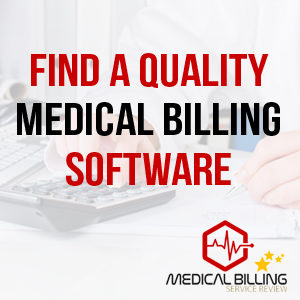
A Review of the Top 10 Medical Billing Services and Softwares in 2023
In the fast-paced medical industry, staying updated with the latest billing software and services is pivotal. As 2023 unfolds, the need for efficient, secure, and reliable medical billing systems is clearer than ever. With various software vying for the top spot, we’ve curated a list of the top 10 medical billing services and software this year.
1. Medisoft 2023
Features:
- Patient scheduling integration
- Detailed reporting capabilities
- Mobile app for on-the-go billing and scheduling
Benefits: Medisoft’s intuitive user interface and comprehensive features make it a favorite among medium-sized practices.
2. AdvancedMD
Features:
- Electronic health records integration
- Patient portal for payment
- Automated insurance verification
Benefits: AdvancedMD offers seamless integration with other medical software, allowing practices to manage billing, scheduling, and clinical records in one place.
3. Kareo Billing
Features:
- Cloud-based platform
- Detailed financial analytics
- Patient payment options and billing insights
Benefits: Kareo is known for its user-friendly design and dedicated customer support, ideal for small to medium-sized clinics.

4. AthenaCollector
Features:
- Real-time claim tracking
- Dedicated follow-up for denied claims
- Predictive analytics for revenue tracking
Benefits: With AthenaCollector, practices can significantly reduce the time between patient service and payment receipt.
5. CareCloud
Features:
- Customizable dashboard
- Contract management
- Integrated telehealth services
Benefits: For practices looking for modularity, CareCloud allows customization to fit the specific needs of the clinic.
6. DrChrono
Features:
- EHR and practice management integration
- Customizable billing reports
- Automated patient reminders
Benefits: DrChrono’s focus on iPad compatibility ensures mobility and accessibility for healthcare providers.
7. PrognoCIS
Features:
- Complete RCM (Revenue Cycle Management) solution
- EHR integration
- Payer contract analysis
Benefits: PrognoCIS offers a holistic approach to medical billing, focusing on maximizing revenue for practices.
8. NextGen Healthcare
Features:
- Cloud or server-based solutions
- Detailed analytics and reporting
- Patient portal with a payment gateway
Benefits: NextGen’s flexibility in deployment and comprehensive feature list make it suitable for various practice sizes.
9. eClinicalWorks
Features:
- Integrated EHR and practice management
- Telehealth services
- AI-driven analytics for billing
Benefits: The inclusion of AI-driven insights sets eClinicalWorks apart, offering predictions and recommendations for billing strategies.
10. Greenway Health Intergy
Features:
- Task-based workflows
- Patient messaging system
- Customizable reporting
Benefits: Intergy’s focus on streamlining daily tasks ensures that practices can manage patient care and billing without feeling overwhelmed.

2023 has ushered in a variety of medical billing services and software solutions designed to cater to the unique needs of medical practices of all sizes. When selecting the perfect solution for your practice, consider factors like the size of your practice, the need for integration with other systems, and specific features that you deem essential. Investing in a robust billing system can optimize revenue streams, streamline administrative tasks, and ultimately lead to enhanced patient care.
What is the Difference Between Medical Billing Software and a Medical Billing Service?
In the healthcare industry, where prompt and accurate billing is crucial, it’s essential to understand the tools at your disposal. Two commonly referenced options are medical billing software and medical billing services. While they both aim to address the same challenge – ensuring the financial health of a medical practice – they do so in distinctly different ways. Let’s break down the distinctions.
Medical Billing Software
Medical billing software is essentially a computer application or program designed for medical setups. This tool allows professionals to meticulously track patient visits, catalog services rendered, and subsequently generate precise invoices. One of the standout features of such software solutions is their automation capabilities, which significantly diminish error margins by mitigating repetitive manual tasks.
A hallmark of many advanced billing software systems is their seamless integration capacity with other foundational platforms in a medical practice, like Electronic Health Records (EHR). This ensures a streamlined, end-to-end management of patient care processes. Additionally, this software often comes with customization options, allowing medical practices to fine-tune their functions for optimum efficiency. Lastly, the element of in-house control cannot be sidelined. With the software either stationed on-premises or accessible via cloud technology, practices retain direct oversight over all billing nuances. Consequently, if a medical practice boasts the necessary manpower and desires unwavering control over billing intricacies, software might emerge as the preferred choice.
Key Features:
- Automation: Many software solutions can automate repetitive tasks, reducing the chances of errors.
- Integration: Often, billing software can integrate with other systems in the practice, like Electronic Health Records (EHR), streamlining the end-to-end patient care process.
- Customization: Practices can often tailor software solutions to their specific needs, ensuring relevancy and efficiency.
- In-house Control: Since the software is based on the practice’s premises (or accessible via the cloud), there’s a direct control over billing processes.
When to Consider: If your practice has the manpower to handle billing in-house and desires control over all billing details, this might be your best choice.

Medical Billing Services
On the other side of the spectrum lies medical billing services. These are entities – either companies or skilled individuals – that shoulder the onus of managing a medical practice’s billing tasks. The immediate advantage here is the pool of expertise they bring to the table. Equipped with professionals abreast of the latest industry regulations and established best practices, these services ensure surgical precision in billing. Another pivotal aspect of such services is their inherent efficiency. With dedicated resources channelized for prompt and accurate billing, the challenges of delays and denials get considerably reduced.
From a financial perspective, particularly for budding or smaller practices, outsourcing might present a more cost-friendly alternative than recruiting and schooling a full-time in-house team. Beyond the mere task of billing, these services offer comprehensive management solutions. This includes direct interactions with insurance entities, proactive follow-ups on pending claims, and the generation of periodic financial audits and reports. Therefore, for setups grappling with limited resources or persistent challenges like high claim refutations or payment lags, roping in a medical billing service might be the most pragmatic decision.
Key Features:
- Expertise: Billing services often employ seasoned professionals who are updated on the latest industry regulations and best practices.
- Efficiency: These services have dedicated resources to ensure timely and accurate billing, reducing delays and denials.
- Cost-Effective: For many practices, especially smaller ones, outsourcing can be more cost-effective than hiring and training a full-time staff.
- Comprehensive Management: Many services don’t just handle billing but also deal with insurance companies, follow up on unpaid claims, and provide regular financial reports.
When to Consider: If you lack the resources to manage billing in-house or if you’re facing challenges like high claim denials or late payments, a medical billing service might be the better option.
While both medical billing software and services aim to streamline the billing process, the right choice for a medical practice depends largely on its individual circumstances. Factors such as the practice’s size, existing infrastructure, budget, and specific challenges all play a role. Some practices even opt for a hybrid approach, using software for daily tasks while relying on a service for specific challenges, like claim denials. Whichever path you choose, the end goal remains the same: ensuring a smooth, efficient, and accurate billing process that supports the financial stability of the medical practice.

Breaking Down the Cost of Medical Billing Services and Software
When evaluating medical billing services and software, a critical factor to consider is cost. Let’s take a closer look at the financial aspects of each to give you a better understanding of what you can expect.
Medical Billing Services
The cost of hiring a medical billing service varies widely based on several factors such as the size of the practice, the volume of claims, and the complexity of the services required. Here’s a general breakdown:
- Percentage of Collections: Many services charge a percentage of the practice’s net collections. This typically ranges from 4% to 10%.
- Flat Fee Per Claim: Some services charge a flat fee for each claim they process. This can range from $1 to $5 per claim.
- Monthly Subscription: For ongoing services, a monthly fee is another option, which can range from $200 to $1,000 depending on the scope of services provided.
Medical Billing Software
The cost of medical billing software is usually more straightforward to estimate, but it can also differ based on several variables such as the number of users, and whether it’s an on-premise or cloud-based solution.
- Upfront Costs: On-premise solutions generally require an initial investment in hardware and software licenses. This can range from $1,000 to $5,000 or more.
- Monthly or Annual Subscription: Cloud-based solutions often work on a subscription model. The cost can range from $50 to $300 per month per user.
- Additional Features: Customization and added features like compliance tracking or integration with EHR systems can also incur extra costs.
Important Questions to Ask
When choosing between a medical billing service and software, consider the following questions:
- What is the volume of billing transactions?
- Do you have the in-house expertise to manage billing effectively?
- What is your budget for billing operations?
Balancing these considerations will help you make a more informed choice that aligns with your practice’s needs and budget constraints.

Benefits of Investing in Medical Billing Services
Navigating the complexities of medical billing can be daunting for many healthcare providers. Medical billing services offer a specialized skill set and tools to streamline the process, ensuring efficient, accurate, and timely billing. Below are some of the compelling reasons to consider investing in medical billing services.
1. Expertise and Knowledge
Medical billing services bring in-depth knowledge of billing codes, insurance requirements, and claim submission procedures. This expertise can be invaluable in avoiding claim denials and ensuring that healthcare providers are reimbursed appropriately for their services.
2. Reduced Errors
The likelihood of billing errors – which can result in claim denials or delayed payments – significantly decreases when handled by professionals. Their sole focus on billing translates to meticulous attention to detail, ensuring that claims are processed correctly the first time around.
3. Cost Efficiency
While there’s an expense associated with hiring a medical billing service, it can often be more cost-effective than maintaining an in-house billing department. This is especially true for smaller practices that might not have the volume of claims to justify the overheads of an internal team.
4. Increased Revenue
With a dedicated service managing billing, practices often see a boost in revenue. This is due to the reduction in denied claims, efficient follow-ups on unpaid claims, and the elimination of billing backlogs.
5. Allows Focus on Patient Care
By offloading the billing responsibilities, healthcare providers can place their primary focus on patient care. This not only improves patient satisfaction but also enhances the overall quality of service.

6. Stay Updated with Regulatory Changes
Medical billing is governed by ever-evolving regulations. Billing services stay updated with these changes, ensuring that your practice remains compliant and avoids potential legal pitfalls.
7. Access to Advanced Technology
Leading medical billing services utilize advanced software and technology to manage claims, track submissions, and generate reports. By hiring such a service, practices get the benefit of this technology without the associated capital expense.
8. Scalability
As your practice grows, a medical billing service can easily scale its operations to match your needs. This flexibility is particularly beneficial for growing practices or those with fluctuating patient volumes.
9. Security and Confidentiality
Reputable medical billing services prioritize data security, ensuring that patient information is protected and compliant with industry regulations like HIPAA.
10. Consistent Cash Flow
With timely submissions and proactive follow-ups, medical billing services can help stabilize and maintain a consistent cash flow for the practice, ensuring that there are fewer fluctuations in revenue.
Investing in a medical billing service can be a strategic decision for many healthcare providers. With the potential for increased revenue, reduced errors, and the freedom for practitioners to focus on patient care, the benefits are considerable. However, it’s essential to find a service that aligns with the specific needs and goals of your practice.

Navigating the Risk of Human Error in Medical Billing
The healthcare industry, with its intricate coding systems and ever-changing regulations, is rife with potential pitfalls, particularly when it comes to medical billing. While the idea of managing billing in-house might seem appealing, especially for small to mid-sized practices hoping to save costs, the risk of human error can often negate these savings. Let’s delve deeper into why human errors in medical billing can be more costly than anticipated.
Complexity of Medical Codes
Medical billing relies on a sophisticated coding system where every diagnosis, treatment, and medical procedure has a specific code. With thousands of codes in the system and many of them looking similar, it’s easy to mistakenly use the wrong one. Such errors can lead to denied or delayed claims, which in turn result in lost revenue for the practice.
Ever-evolving Regulations
The landscape of medical regulations is in constant flux. From adjustments in the coding system to changes in insurance requirements, keeping up with these alterations can be a mammoth task. Even minor oversights or outdated practices can lead to claim rejections, which not only impacts revenue but also requires additional time to rectify.
Data Entry Mistakes
Something as simple as a typo in a patient’s insurance ID, misalignment of codes, or an incorrect date can result in claim denials. These simple data entry mistakes, often overlooked due to oversight or fatigue, can have cascading consequences for a practice’s revenue cycle.

Lack of Dedicated Follow-Up
In the absence of a dedicated billing team, many practices fail to follow up on unpaid or denied claims actively. The reasons for denial can sometimes be as simple as missing documentation or clerical errors, which, if addressed promptly, could result in successful claim processing. However, with other pressing responsibilities, these follow-ups can get sidelined, leading to missed revenue opportunities.
Potential for Financial Mismanagement
Incorrect billing can also inadvertently lead to fraudulent claims or incorrect patient bills. While unintentional, these errors can have severe legal implications and damage the reputation of the practice.
Overburdened Staff
When medical practitioners or administrative staff take on billing tasks, they often juggle them alongside their primary responsibilities. The divided attention can exacerbate the chances of errors and also detract from their core duties, affecting overall efficiency.
Taking Proactive Measures
To mitigate the risks of human error in medical billing, practices can:
- Invest in regular training sessions to keep the team updated on coding changes and regulations.
- Utilize medical billing software with built-in error-checking mechanisms.
- Consider outsourcing billing to dedicated professionals who can bring expertise, advanced technology, and a focused approach to the task.
While the human touch is invaluable in healthcare provision, medical billing is one area where the risk of human error can be costly. By recognizing these risks and taking proactive measures, practices can ensure a smoother, more efficient billing process that safeguards their revenue and reputation.
Author: Mike Cynar
Mike Cynar brings buyers and sellers together by producing reviews and creating non biased webpages allowing users to share their experiences on various products and services. He and his staff write informative articles related to the medical field, legal, and other small business industries.

Leave a Reply